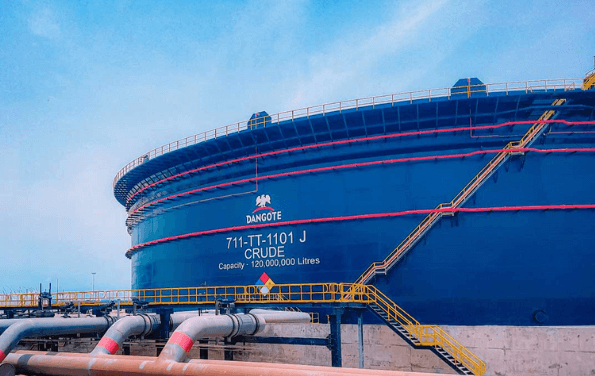Nigeria, despite being Africa’s largest crude oil producer, finds itself in a paradox it cannot afford to ignore. Once again, headlines are dominated by another disruption in the country’s fragile energy ecosystem—this time, triggered by Dangote Petroleum Refinery’s decision to suspend petrol sales in naira. While the move may be temporary, its significance is anything but temporary. It has reignited urgent questions around energy security, monetary policy, and the true cost of depending on a system that has repeatedly failed to deliver affordable and accessible energy to Nigerians.
When the Dangote Refinery began operations in 2024, many heralded it as the dawn of a new era. With a refining capacity of up to 650,000 barrels per day, the refinery was poised to reposition Nigeria’s fuel landscape, drastically reducing the need for imports and theoretically lowering prices. Indeed, in its first few months of operation, Dangote’s ex-refinery price of $736 per ton (roughly ₦898.78 per litre or $0.55) offered a glimmer of hope to consumers battered by inflation and subsidy removal. But that hope has been short-lived.
Reports now confirm that Dangote has temporarily halted petrol sales—particularly for marketers purchasing in naira. The reason? A fundamental imbalance between naira-based sales and dollar-based operational obligations. The refinery’s crude procurement deal with the Nigerian National Petroleum Company (NNPC) was denominated in naira under a six-month agreement. However, with international debts and operational costs tied to foreign currency, Dangote has been forced to reassess its pricing strategy, citing the inability to continue transactions that do not guarantee exchange rate protection or profitability.
This development has significant implications for the economy. Petrol prices are projected to rise, compounding inflation and increasing transport costs. The rush for dollars by marketers could put additional strain on Nigeria’s already unstable foreign exchange market, further devaluing the naira. As history has shown, fuel price spikes tend to reverberate across the economy, from food prices to household incomes. Millions of Nigerians, especially those at the bottom of the economic pyramid, will bear the brunt.
However, the Dangote crisis is symptomatic of a deeper, systemic issue: Nigeria’s longstanding failure to build an energy system that is economically and socially sustainable. Despite being rich in oil, the country has remained dependent on refined fuel imports for decades. Even with domestic refining now possible, the absence of integrated planning—one that aligns currency policy, refining strategy, and social welfare—has left both businesses and citizens vulnerable.
Some analysts defend the refinery’s decision, arguing that in a liberalised market, a business must price in a way that protects its balance sheet. With foreign loans and forex volatility, selling in naira at current market rates may be commercially unviable. However, others warn that treating fuel purely as a commodity ignores its role as a public good. Fuel powers the economy; excluding smaller marketers or consumers from access due to dollar-only pricing could create deeper inequality.
Sustainability should be viewed not just through the lens of environmental protection, but as a framework for economic justice and social inclusion. Energy access is a human right. The refinery may be a private-sector innovation, but its role in public life cannot be overstated. It is expected to hold itself to such standards that consider the broader development goals of the nation. Every thought-leading business considers the broader national and global socio-economic goals when determining its own strategic direction and actions. This is because the world is not an amalgamation of isolated villages, but an intricate ecosystem governed by the intangible elements of smaller actions led by people in positions of authority—whether formal or informal.
The current crisis offers potential benefits which become apparent if we choose to view it through a reframed perspective. The disruption should be seen as a trigger for building an energy ecosystem that achieves resilience along with fairness and readiness for future demands. The foundational principles directing Nigeria’s energy management urgently demand comprehensive change including areas beyond infrastructure such as economic stability and environmental accountability along with social inclusion.
The initial step should be to develop a national energy resilience framework which merges local refining operations with defined currency management approaches, as well as incorporates social equity considerations. This framework would enable private-sector innovation through supportive macroeconomic conditions and business pressure reduction, while maintaining consumer access protection.
Pricing transparency and regulatory coherence must both be maintained simultaneously. The implementation of market liberalisation policies does not necessarily lead to market volatility. Nigeria will be able to defend enterprise sustainability and public welfare through structures, including fuel pricing benchmarks, flexible forex windows for strategic sectors and equitable distribution mechanisms.
The current situation presents an exceptional opportunity for corporate leaders to make their mark. Businesses such as Dangote Refinery should use this opportunity to promote joint-policy discussions and demonstrate how private sector profit objectives can support national development initiatives. Leading companies that engage in multi-stakeholder discussions have the power to shape reforms and build public trust while showing forward-thinking sustainability approaches that mark enduring legacy companies apart from those only focused on the short term.
Sustainability transcends regulatory requirements to become a fundamental strategic necessity. Only companies that understand systemic impact, while adapting to socio-economic changes and supporting inclusive growth, will achieve long-term success. Crisis situations put systems under pressure, yet they uncover how strength combined with strategy and solidarity can produce lasting transformation.
How Nigeria develops its energy sector and its overall development path will be determined by our current actions. We have the opportunity to act boldly while considering every group, and balancing future consequences..


